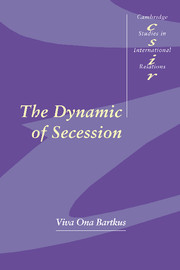Book contents
- Frontmatter
- Contents
- Acknowledgments
- I Introduction
- II The costs and benefits
- III The dynamic of secession
- 7 “Last resorts”: a rise in the costs of membership
- 8 “Opportune moments”: a reduction in the costs of secession
- 9 A reduction in the benefits of membership
- 10 A rise in the benefits of secession
- 11 Conclusion
- Bibliography
- Index
- CAMBRIDGE STUDIES IN INTERNATIONAL RELATIONS
9 - A reduction in the benefits of membership
Published online by Cambridge University Press: 22 September 2009
- Frontmatter
- Contents
- Acknowledgments
- I Introduction
- II The costs and benefits
- III The dynamic of secession
- 7 “Last resorts”: a rise in the costs of membership
- 8 “Opportune moments”: a reduction in the costs of secession
- 9 A reduction in the benefits of membership
- 10 A rise in the benefits of secession
- 11 Conclusion
- Bibliography
- Index
- CAMBRIDGE STUDIES IN INTERNATIONAL RELATIONS
Summary
The Ibo, Bengali, and Southern Sudanese communities investigated earlier responded to the state's escalating threat to their lives and culture with secession. By contrast, for the numerous distinct communities embedded in developed Western societies, the motivation for secession decisions lies not in state-sponsored threats to their way of life, but rather in the perceived “mere” reduction in what they have come to expect as the normal security, economic, and social benefits of membership. The purpose of this chapter is to explore how fundamental changes in these benefits can result in the same consequences – a secession crisis.
The secession dynamic here differs from the secessions arising from “last resorts” or “opportune moments” described earlier. Reduction in the benefits of membership often occurs almost unnoticed. Historically such gradual changes have motivated fewer responses because they are frequently overshadowed by other essential factors which constitute the costs of both membership and secession. Whereas Chapter 7 disclosed that all other considerations become irrelevant once the distinct community is confronted by escalating violence or worsening forcible cultural assimilation, in the cases here the fact that the benefits of membership play the primary role in generating support for secession in itself implies the absence of mortal or cultural costs.
- Type
- Chapter
- Information
- The Dynamic of Secession , pp. 167 - 201Publisher: Cambridge University PressPrint publication year: 1999



